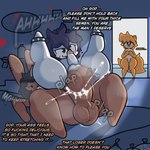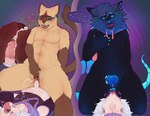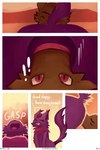
onomatopoeia
Onomatopoeia are words that represent sounds - text-based onomatopoeia are extremely commonplace in comics and illustrations. Onomatopoeia are usually written outside of speech bubbles, and almost always drawn in proximity to whatever or whoever is making the sound. Not all onomatopoeia are "formal words" - blorp, shlick, thwap, splurt are examples of coined words used as onomatopoeia.
General guidelines
Onomatopoeia includes dictionary words ("Buzz", "Huff", "Lick", "Twitch"), slang words ("Plap", "Shlick"), constructed or modified words ("Glorp", "Shlop", "Splurt", "Thoom"), and multiple word sound effects ("Horny squeak"). The subject matter of the word doesn't matter (though be careful with tagging vocalizations). Most words can theoretically function as an onomatopoeia.
Onomatopoeia may contain spelling or formatting "mistakes" to better communicate the sound being represented. Onomatopoeia may have repeated letters or added hyphens to "stretch" the sound ("Me-ow", "Fizzzzzz"), capitalized in ways to suggest variation in volume ("creeEEEak"), or be spelled incorrectly to be more evocative ("Shlurp" for slurp, "Bworp" for burp "Pap" for plap etc.)
Use the following criteria to determine if a sound effect is an onomatopoeia.
- Many vocalizations do not count as sound effects. For exceptions, see Vocalizations section.
- Most animal noises, and breathing noises in their proper forms count as onomatopoeia.
- Vowelless forms are never onomatopoeia.
- They may not always qualify as sound effects either. The ones that do fall under vowelless_sound_effect.
- The form is not excessively garbled (contains random, non-sensible letters).
- The form is a fully formed word, formed with multiple words, or appears like it could pass off as a word.
- Onomatopoeia may contain extra letters than it should have ("Mooo", "Riiip", "Sluurrrp"), but should not be tagged when the form is missing letters that it should have ("Bzzz", "Gurgl", "Swsh").
- Alternate spellings are usually okay to tag as onomatopoeia ("Slurk", "Shlurk", and "Schlurk" are all onomatopoeia).
This definition is intentionally broad, both for tagging convenience, and to ensure that one can reliably use this tag without depending too heavily on outside sources.
Vocalizations
Many vocalizations do not qualify as a sound effect, with the exception being those that are represented by onomatopoeic words. If the term is better described as a grunt, laugh, or moan, the sound_effects tag probably doesn't apply. However if the moan is literally identified as "Moan", or the laughing term as "Giggle", the usage should be treated as a sound effect and a vocalization. Most animal noises ("Chirp", "Meow", "Woof", etc) function the same way being both onomatopoeia, and vocalizations.
List of Onomatopoeia
An extensive but non-exhaustive list of common onomatopoeia, some of the following have multiple meanings, depending on context.
- Animal Noises
- "bark" - dog noises
- "chirp" - birds, sometimes crickets
- "meow" - cat noises
- "moo" - cow noises
- "ribbit" - frog noises
- "neigh" - horse noises
- "squeak" - can represent animal noises (especially rodents) squeaking, something with a squeaker being squeezed, or rubber/latex/etc. clothing or objects being interacted with or moved around in
- Physical Contact/Actions/Phenomenon
- "bang" / "bonk" - a hard impact
- "boom" - an explosion, sometimes "ka-boom" for added emphasis
- "blorp" - a deep wet bubbling sound, air bubbles under water
- "brap" - gunfire, a car or motorcycle engine
- "chomp" - biting into something
- "crack" / "snap" - something breaking suddenly, with a sharp noise
- "click" - the sound of a computer mouse button being pressed, high heels on a tiled or wood floor
- "creak" - a harsh, usually high-pitched sound when moved, or when pressure or weight is applied, something straining
- "slap" / "smack" / "clap" - flesh hitting flesh, applause, an open hand striking someone or something, during sexual intercourse
- "fap" - penile masturbation
- "fizz" - something fizzling, such as a carbonated beverage
- "pat" - something or someone being patted
- "plap" - a sound representing a dull flesh and flesh impact, most commonly while thrusting into someone
- "plop" - A short sound as of a small, solid object dropping into liquid, also "plunk"
- "pop" - something bursting, like a bubble or balloon, or coming unstuck from a tight place
- "rattle" - a rapid succession of short sharp noises, e.g. a snake rattle, windows rattling
- "shlick" - contact with an oily, or wet surface, a sound effect version of the word slick
- "splash" - something hitting a body of liquid with a large effect, e.g. someone diving into a pool
- "splurt" - a sudden squirt or rush of liquid
- "slosh" - liquid moving within a confined space
- "squelch" - a wet sucking noise, like removing a shoe from wet mud
- "tick" / "tock" - usually written together as tick-tock (with variations of spelling), or as "tick" alone, the sound of a clock or metronome
- "thump" / "thud" / "thunk" - a dull, heavy impact between two solid objects, can sometimes be used in body-on-body contact
- "thwap" - a heavy slapping sound, think rolled up newspaper, or magazine being slapped on a desk
- "ring" - the sound of a bell, usually associated with a ringing telephone
- "woosh" - air rushing by, something flying through the air and/or moving very quickly
- "zap" - a burst of energy, associated with electricity, radiation, and lasers
- "zoom" - something moving very fast
- Vocalizations and Bodily Noises
- "burp" / "belch" - burping, frequently altered for evocative purposes ("bwelch" "buraap" etc.)
- "brap" - farting, usually used alongside non-onomatopoeic sound effects (pbbt, frrt etc.)
- "groan" - as a vocalization is similar in sound and meaning to a moan, can also be used for bodily noises, see "gurgle" bellow
- "growl" - a low guttural vocalization, usually indicating anger or frustration
- "gulp" - swallowing, can also be represented by "glug" or "ulp"
- "gurgle" - usually associated with a rumbling stomach, indicating hunger, digestion, or an upset stomach, may be used to indicate liquid being moved within the body
- "blorp", "growl", "rumble", "grumble" and "groan" can also be used in this context, often with altered spelling for evocative effect
- "hiccup" - hiccuping, sometimes written as "hic" or combined with belching "hiccurp"
- "huff" - loudly blowing out air, when written repeatedly represents panting, often combined with an iconographic puff of air
- "moan" - a long, low sound made by a person expressing suffering, despair, or alternatively, sexual pleasure
- "nom" - a "cute" vocalization made while biting into something
- "om nom nom" - "cute" onomatopoeia for eating, chewing etc.
- "slurp" - licking, drinking, wet sucking
- "slosh" - liquids moving within a confined space, a bloated character's stomach may slosh
- "splurt" - spitting, ejaculation
- "doki" - A heartbeat
Related Tags
- Subcategories of Onomatopoeia
- contact onomatopoeia - Terms related to physical contact (rubbing, gripping, squeezing)
- impact onomatopoeia - Terms related to hitting / striking.
- motion onomatopoeia - Terms related to physical motion (twitching, throbbing, wiggling, wagging, swishing)
- multi-word onomatopoeia
See Also
The following tags are aliased to this tag: onomatopeia (learn more).
This tag implicates sound_effects, text (learn more).
The following tags implicate this tag: contact_onomatopoeia, motion_onomatopoeia, multi-word_onomatopoeia (learn more).
Posts (view all)


